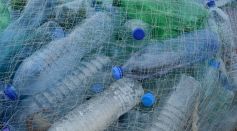Tags: Plastic Waste

Italy is Now Using Pasta Straws to Help Reduce Plastic Waste

Gift Ideas You Can Buy That Don't Require a Gift Wrapper

New Recycling Method Turns All Plastic Waste into High-Quality Plastic

Peruvian Introduced Plates Made from Banana Leaves

UNIQLO to Produce Shirts Made of Plastic

Plastic problem in the Philippines: Poverty is the cause?

Newly invented bacteria eats plastic

Starbucks to replace plastic straws with sippy cups for adults
Newly Discovered Plastic Waste Looks Just Like Pebbles
Minimizing Plastic Waste is a Personal Responsibility
Some of America’s Most Popular Restaurants Plan to Ban Plastics by 2020
Cigarette Butts are a Bigger Pollution Problem Than Plastic Straws
A Mushroom that Lives Solely on Plastic Has Been Discovered
How Cutlery Evolved into a Major Environmental Threat
Single Vermont Bill Prohibits Usage of Four Major Single-Use Plastic Waste Sources
Coca-Cola to Invest in a Billion Peso Recycling Facility in the Philippines
Toothbrushes Are a Significant Part of the Plastic Crisis
The Rise of Plastic Pollutions Threatens Seabird Species and Marine Life
Philippine Inventor Converts Plastic to Clean Fuel
Wild Bees Are Using Plastics to Build Their Nests
Most Popular

Starlink Satellite Explodes in Orbit; SpaceX Confirms It'll Re-Enter Earth

Aurora Phenomenon: How Geomagnetic Storms and Space Weather Are Lighting Up the World

Ocean Warming Explained: Why Climate Science Shows Sea Temperature Rise Is Speeding Up

How Wildfires Start, Spread, and Ignite: Understanding the Causes and Fire Behavior Clearly





